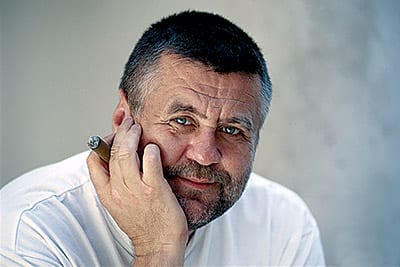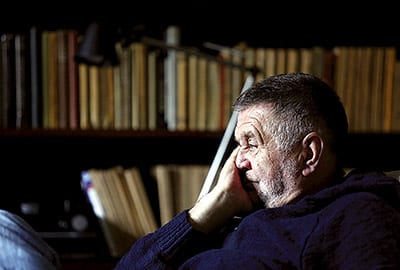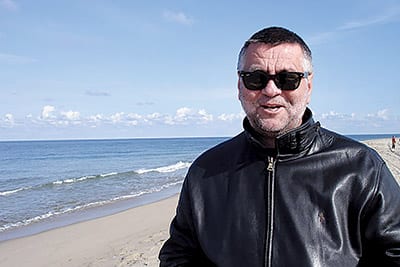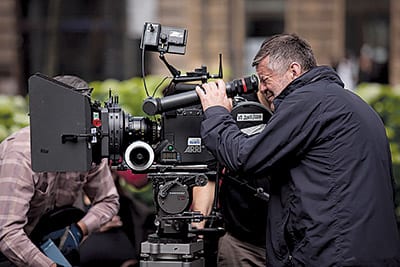He has signed his name to around 30 feature and documentary films, winning the most awards in Yugoslavia and Croatia, while his latest film, The Constitution, is considered the boldest and one of the best films shot in recent decades on the territory of the former Yugoslavia. He has lectured in America for over 25 years and is a prominent professor and ‘Eminent Scholar in Film’ at Ohio University
His father, Danko Grlić, who was a famous Yugoslav philosopher and university professor in Zagreb, a Marxist and amember of the Praxis group and the famous Korčula school, was not delighted when his son abandoned his philosophy studies and opted for that circus called film. And it was only after watching his film In the Jaws of Life, in 1985, when his son Rajko (1947) had already developed a serious career in cinematography, thathe led him aside and said to him: now you can play with film as much as you like!
Rajko’s mother, Eva, was born in Israel but was a Yugoslav Partisan and fighter of the famous First Proletarian Brigade. Following the end of World War II, she came into conflict with a senior officer of the State Security Service in Zagreb.That cost her three years in prison on the barren island of GoliOtok.. Eva wrote a precious autobiographical study of her life under the title of Memories, in which she described an exciting life during which she had survived great tragedies.
Rajko’s parents had been pre-war schoolmates, leftists from urban families of good standing, but they never lost their utopian hope that the world could be better. They never raised their son to hate anyone, nor even the system that had been cruel to them:
 “It was wonderful for me to grow up surrounded by people who weren’t frustrated and did not have hatred in their stomachs. That’s what my parents and most of their friends were like, all leftists, practitioners, members of the famous Korčula school. They tried to create something, rather than hate something,and thus the Praxis group and Korčula summer school were for me some kind of base determinants of the time and space in which I was lucky enough to grow up. Intellectuals from this area have never again been in the maelstrom of critical world thinking in the way that they were back then, through those two institutions. In the early 1970s both Praxis and the Korčula school were pretty cruelly banned. I don’t know who had the worse opinion of them: official socialism back then or official nationalism today. In short, I’m very proud to have been able to be an observer, listener and witness to all of that.”
“It was wonderful for me to grow up surrounded by people who weren’t frustrated and did not have hatred in their stomachs. That’s what my parents and most of their friends were like, all leftists, practitioners, members of the famous Korčula school. They tried to create something, rather than hate something,and thus the Praxis group and Korčula summer school were for me some kind of base determinants of the time and space in which I was lucky enough to grow up. Intellectuals from this area have never again been in the maelstrom of critical world thinking in the way that they were back then, through those two institutions. In the early 1970s both Praxis and the Korčula school were pretty cruelly banned. I don’t know who had the worse opinion of them: official socialism back then or official nationalism today. In short, I’m very proud to have been able to be an observer, listener and witness to all of that.”
When it comes to Jewishness, in my case it is a cultural mark rather than a religious one, and as such, I carry it with pride. Admittedly, that isn’t particularly popular in Croatia today, but that’s not my problem.”
He summarises the upbringing he took away from his childhood home in a single sentence “as a good civic upbringing of the provincial left,”while he calls the most valuable part of that upbringing “joy, some hedonistic interpretation of life mixed with the faith that it is worth fighting for what you care about.”
CorD’s interlocutor has occasionallybeen accused – primarily due to his films or public statements – of not being a good enough Croat, and at that his blood cells were counted in the most vulgar way. That’s why he clarifies his national doubts in this statement for CorD:
“In the birth certificate issued in Zagreb in 1947, it is written that I am a Croat, that my mother and father were Croats. On the other hand, I am a city kid with a long urban pedigree. And in Zagreb, like in every other larger city, that means you are something of a mongrel. In the cities, unlike in small communities, the people came together, married and had kids despitenational and religious barriers. It is difficult to explain to today’s children that there were times when people who were different weren’t necessarily hated. Thus, my mother’s father, from a Sarajevo Sephardic Jewish family, married her mother, who was from a Budapest Ashkenazi Jewish family. And that’s how my father’s father, whose ancestors were Danube Swabians, married my father’s mother, whose ancestors were 50/50 – half Banija Serbsand half Germans from the Schwarlades, who came to Zagreb three hundred years previously as bell smelters.
 That mix never burdened me, even though it suddenly fell, with the emergence of the nation-state, under the category of suspicious origin.
That mix never burdened me, even though it suddenly fell, with the emergence of the nation-state, under the category of suspicious origin.
And finally, when it comes to Jewishness, in my case it is a cultural mark rather than a religious one, and as such, I carry it with pride. Admittedly, that isn’t particularly popular in Croatia today, but that’s not my problem.”
The children of famous parents have various careers, though as a rule they are burdened by the success of their parents, and often their success is described only in relation to the blood of those whose surnames they carry. Rajko grew up with his famous father’s surname and it is logical to ask him how much he was burdened or assisted by the fact that he was the son of celebrated and intellectually influential parents:
“That didn’t burden me, but I don’t think it helped me either, if you’re asking if I gained some public benefit as a result. Those who decided about my films didn’t particularly pay heed to intellectuals.”
Rajko’s received his first camera for Christmas at the age of 14. He says that it was then that his never-endinggame began. He fought successfully for this fantastic position of considering his job a game from then to this day. This is a game in which there are millions of elements, but it is essentially a game of storytelling. It was with this camera that he shot his first amateur film, Cigla [Brick]:
“It lasted a full five minutes. That was way back in 1964. Zagreb thugs back then would approach loving couples in parks and gift them a brick. That‘gift’ meant that three of four thugs were surrounding the couple on the bench and the young man had to buy the brick from them, or else face a beating.”
I lost all my illusions about politics back in 1968. The Prague Spring forever took from me any innocent belief I had in the possibility of politics with a human face
Attending the famous FAMU film academy in Prague was then a dream of many youngsters who wanted to become film directors. That dream was realised by the likes of Lordan Zafranović, Srđan ‘Điđa’ Karanović, Goran Marković, Goran Paskaljević, Emir Kusturica … and Rajko Grlić, who was one of the best students of what was then Europe’s most desirable film school. Today we ask him what he remembersbest about his studies in Prague:
“The socialism we arrived in was much greyer and more rigid than the one we grew up in, while culture and some general standardsof life were higher than that from which we’d come. We were astonished by the importance of culture, sexual liberties… It’s strange that I switch to the plural whenever I talk about Prague. There were several of us and we became good friends.With the passage of time, Prague somehow became our shared past. In short, I went there as a child and returned, as Bubule – Bane’s father in the TV series Grlom u Jagode [The Unpicked Strawberries] – would say, like a mature man.”
 After the filmCharuga, he received an invitation to lecture at the prestigious New York University. However, he expressed his thanksfor the invitation and then returned to Zagreb, where he quickly realised that this film had actually led to him being blacklisted all over the then SFRYugoslavia. He headed to New York and led a MSc. direction workshop for postgraduate studies. Student were led in the second year by Spike Lee and in the third by Arthur Penn. After gaining such an opportunity, he was later able to choose what and where he would go next. And so, for the last 25 years he has lectured in America, spending the longest period in Ohio. Asked if he received an offer to be a professor in Zagreb and what working with students means to him, he answers:
After the filmCharuga, he received an invitation to lecture at the prestigious New York University. However, he expressed his thanksfor the invitation and then returned to Zagreb, where he quickly realised that this film had actually led to him being blacklisted all over the then SFRYugoslavia. He headed to New York and led a MSc. direction workshop for postgraduate studies. Student were led in the second year by Spike Lee and in the third by Arthur Penn. After gaining such an opportunity, he was later able to choose what and where he would go next. And so, for the last 25 years he has lectured in America, spending the longest period in Ohio. Asked if he received an offer to be a professor in Zagreb and what working with students means to him, he answers:
“I’ve received offers recently from a number of private schools that need an impressive title, such as my ‘Eminent Scholar’ title here. But that’s why in Slovenia, at our next-doorneighbours, I am a regular professor at the University of Nova Gorica. It is an amazing privilege to socialise with people who see the world not only from the perspective of their youth, but also from their cultures that are often very different.”
Grlić doesn’t accept the idea that he is an emigrant, as he lives in both America and Croatia, lectures in Slovenia and, thanks to technology, also gives lessons via Skype, so the concept of an emigrant has today lost its previous meaning entirely. Still, he notes:
“I live there and in Croatia, but I’m actually trying to never leave Zagreb… as much as that’s possible. However, when you place your life in something called a suitcase once, you never again leave it. You’re at home everywhere, and you’re never at home anymore. You are a traveller.”
The unique festival that Rajko created in Istria in 1999 is the Motovun Film Festival, which screens the creations of small and independent European film production houses. He is no longer part of the festival team, but when asked how much this festival means to him, he answers:
“A lot. For me,that wasn’t a film festival. For me it was an eventthat I worked on and in which I enjoyed myself wholeheartedly for ten years. And when it was the most beautiful for me I said ‘enough’. Simply to ensure I didn’t spoil the good taste in my mouth.”
Policies have caused crimes of an enormous scale in this region, and we will try to not talk about that with discomfort for a long time to come. Let’s hope that our kids can be at peace not talking about it
Grlić has to date made around thirty films, both features and documentaries, and won numerous awards in Yugoslavia and Croatia, but also beyond the borders of these countries, and his latest film,Ustav Republike Hrvatske [The Constitution], is considered one of the best films to have been shot in the former Yugoslavia during recent decades. If this film is the crowning glory of his career, does he consider that enough for an artist of his age? His friend and colleague Srđan Karanović has long since given up his camera… and his students:
“For a man of my age,all that I’ve created is more than enough. However, unfortunately, unlike my friend Karanović, I don’t know how to stop or, more precisely, I’m afraid to do so.”
 He has been writing in partnership with writer Ante Tomić, who lives in Split, for the past 12 years. Together they have written screenplays for four feature films. Of particular importance is their latest joint venture,The Constitution, about professor Vjeko, who lives in downtown Zagreb with Hrvoje, his crippled father who is a former Ustasha officer. Vjeko (played magnificently by Nebojša Glogovac in what turned out to be his last film role) enjoys walking at night, when the wanders the city dressed as a woman. During one of these walks he is beaten up by a group of young men. He is recognised in the hospital by Maja, a nurse who lives in the basement of his building. Maja then begins to take care of him and his father. In return, Vjeko assists Maja’s husband, a police officer called Ante, to prepare for an exam from the Constitution of the Republic of Croatia… And thus begins this story of love and hate;this story about four very different people who are destinedto become mutually dependent. More precisely, this is how the story of one of the boldest films ever recorded, not only in Croatia, begins.
He has been writing in partnership with writer Ante Tomić, who lives in Split, for the past 12 years. Together they have written screenplays for four feature films. Of particular importance is their latest joint venture,The Constitution, about professor Vjeko, who lives in downtown Zagreb with Hrvoje, his crippled father who is a former Ustasha officer. Vjeko (played magnificently by Nebojša Glogovac in what turned out to be his last film role) enjoys walking at night, when the wanders the city dressed as a woman. During one of these walks he is beaten up by a group of young men. He is recognised in the hospital by Maja, a nurse who lives in the basement of his building. Maja then begins to take care of him and his father. In return, Vjeko assists Maja’s husband, a police officer called Ante, to prepare for an exam from the Constitution of the Republic of Croatia… And thus begins this story of love and hate;this story about four very different people who are destinedto become mutually dependent. More precisely, this is how the story of one of the boldest films ever recorded, not only in Croatia, begins.
For each of their joint films, Tomić and Grlić met up around a dozen times and spent ten to fifteen days together in a room, writing for about ten hours a day, which Grlić summarises as follows:
“If that man wasn’t dear to me, I certainly wouldn’t have endured that. Ante Tomić is a cheerful and wise being, and beneath that humour he can be very dark. But he packs that so well into the ease of smiling that it’s a great pleasure to work with him.”And when they finished their first joint film, Karaula [The Border Post], Tomić explained:
“Rajko has a wonderful gentleness and calmness in his approach. He worked for two years with Ante Tomić and never once told him to get lost. That has never happened anywhere and with anyone before. To date I have managed to compel all of my associates to at least momentarily consider suicide. But not him. He seemed relaxed the whole time. It seemed to me that he didn’t expect much of me. And I ultimately gave him more than I thought I could ever give. I extracted unbelievable sentences from my mind and heart.”
A long, strong and enduring friendship exists between Rajko and Belgrade director Srđan Karanović. They worked together more than forty years agoon the TV series The Unpicked Strawberries, which to this day remains one of the most beloved works of TV among all generations. Grlićand Karanović wrote the series together:
“I recall that we wrote it in Zagreb… It was our custom on joint screenplays for the one who was too direct to do the first and final drafts by themselves, and to worktogether in between. He wrote the last version of The Unpicked Strawberries, and by then I was already in the army, based in Belgrade,in Voždovac, and I was given permission not to sleep for two nights, but to sit in some office and read. And so I sat, read and underlined something, like a soldier.
“When it was filmed in Rovinj, I was given seven days, so I could attend the shoot. It was a lot of fun for me there, because I didn’t do anything… Điđa had a basic structure as an idea for the series. There was nothing similar at that time. And it was infinitely popular. That was a reference to a generation. This series presented what the films of independent American directors did for their generation. It’s a portrait of a certain generation at a certain moment in time. Today it is a document. It has nothing to do with fiction. It is a summary of all of our experiences, the experiences of our parents, sentences uttered by both my mother and his…”
And when asked where the characters from that series would be today, Grlić replies:
“Well, by now they’d already be entering the period of mild sclerosis, dementia and so on. Yes, that would now be the third part and would testify wonderfully to the collapse of a country, and the dreams of a generation and the demise of those dreams.”
The Prague Spring forever took from me any innocent belief I had in the possibility of politics with a human face.
This director, who has circled the world with his films, believes that his colleagues make films for themselves and a few of their friends, which he sees as a measure of reality:
“As soon as you start working for millions of viewers, you also start with a series of ingratiating elements. And the film starts to resemble a big general place. We are the authors of films about little nations and we shoot those films in little languages. If you start ingratiating such a film, you lose both yourself and the film. I strive for my films to be as local as possible, to plunge as deeply as possible into reality, because I think that’s the only way they could be understood by someone in Antarctica.”
How much is Rajko bothered, moved, regaled or irritated by what’s happening on the Croatian political scene? What kind of relationship does he have with the Croatian government today?
“It moves me, but doesn’t rejoiceme, and really irritates me. And when it comes to my relations with the Croatian government today, I am too old to ingratiate myself with the authorities, and I also believe the government has more serious business than to treat me. I lost all my illusions about politics back in 1968. The Prague Spring forever took from me any innocent belief I had in the possibility of politics with a human face. That distance you receive in your younger years is very painful and prevents you from really warming up to any politics, to believe in that money game, which is what politics has more or less been reduced to today.
Throughout my entire life I’ve been in conflict with that which is called politics. Politics has changed, but ultimately it looks dreadfully similar, regardless of the fact that every policy starts as the opposite of that which preceded it. Policies have caused crimes of an enormous scale in this region, and we will try to not talk about that with discomfort for a long time to come. Let’s hope that our kids can be at peace not talking about it.”
And how does this professor in Ohio experience the political scene in the U.S. over the last year:
“Like most others; as though watching a socially devilishly dangerous, infinitely kitsch, bad and completely humourless reality show”.
He says that the American art scene todayis “alive and rich, wise and ridiculous in its diversity.”
Many filmmakers worldwide have a goal of possessing one of the planet’s most prestigious awards–an Oscar. When asked if he ever dreamt of an American Academy Award, Grlić explains simply:
“I must admit that I don’t consider that the most important thing that can happen to a film. In short, I didn’t dream of an Oscar. However, it’s good to be acknowledged; though I had no chance. Of the twelve films I’ve made, none were officially suggested by the state for that contest – neither in Yugoslavia nor in Croatia today. So, with The Constitutionthe same thing happened as happened a long time ago with You Only Love Once – it was selected,then replaced overnight.
Rajko is married to Ana and has a daughter, Olga, who is a successful designer in America. Asked how he believes she viewed his work while she was growing up, Rajko smiles:
“I don’t think she hated the fact that her dad worked on movies.”